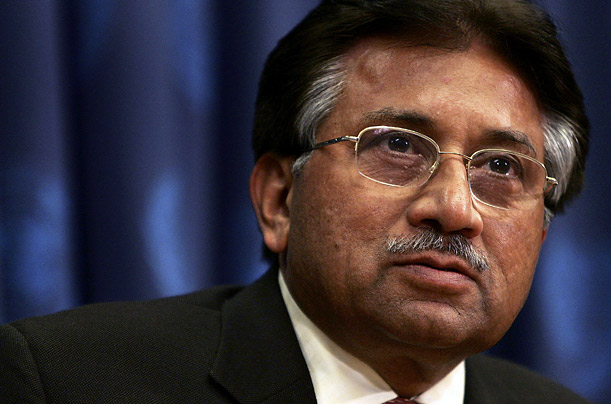RAWALPINDI, Pakistan, (Reuters) – A court in Pakistan charged former military dictator Pervez Musharraf today with the 2007 murder of Benazir Bhutto in an unprecedented move likely to anger the all-powerful army.
The indictment of the army chief who seized power in a 1999 coup – once Pakistan’s most powerful man – was almost an unthinkable event in a nuclear-armed country ruled by the military for half of its 66-year history.
Bhutto, a former prime minister, died in a suicide gun and bomb attack in December 2007 after a campaign rally in the city of Rawalpindi, not far from the heavily guarded court room where the charges were read out on Tuesday.
“He should be tried,” the public prosecutor, Mohammad Azhar, told reporters after a brief hearing during which the three charges of murder, conspiracy to murder and facilitation of murder were read out to Musharraf.

The case has shattered an unwritten rule that the top military brass are untouchable as the South Asian country tries to shake off the legacy of decades of military rule under the new government of Prime Minister Nawaz Sharif.
It was Musharraf who toppled Sharif’s government in the 1999 coup, and memories of that time are still fresh in the current administration. Sharif was sentenced to a life in jail by Musharraf but was eventually allowed to go into exile.
Security was tight in Rawalpindi – the seat of Pakistan’s military headquarters – after a previous hearing on Aug. 6 was delayed due to threats to Musharraf’s life. The Pakistani Taliban have on many occasions threatened to kill him.
Hundreds of police were deployed along the main road leading to the court as well as on rooftops as Musharraf’s car arrived. Journalists were not allowed in the court room for the hearing which lasted about 20 minutes.
Musharraf, who turned 70 on Aug. 11, made no public remarks as he arrived but denied all the charges against him once inside the court room, a lawyer from his defence team told Reuters.
“All the cases against Musharraf are fabricated. He denied all the charges,” said Afshan Adil, the lawyer. The next hearing was set for Aug. 27.
DIFFICULT OR IMPOSSIBLE TO PROVE
Observers believe it is still possible Musharraf would be allowed to go back into exile in a face saving solution.
Imtiaz Gul, an independent security analyst, said the indictment might be profoundly symbolic but there was still little chance of Musharraf actually being convicted.
“Legally, it means it will be a long drawn-out case because it will be very difficult if not impossible to prove the direct involvement of Musharraf,” Gul said.
Gul said the army – which would not comment on Tuesday’s indictment – had tried to warn Musharraf about the legal dangers he faced before he decided to return from exile this year to contest a May election.
Nevertheless, there would be many former colleagues angry to see their old boss dragged through the courts.
Bhutto was killed weeks after she returned to Pakistan from years in self-imposed exile.
A U.N. commission of inquiry said in a 2010 report Pakistan failed to properly protect Bhutto or investigate how she died. At the time, the government blamed Pakistani Taliban militants. Musharraf has said he warned her of the danger she faced.
Musharraf himself came back to Pakistan this year hoping to contest the election after nearly four years of self-imposed exile. Instead, he was disqualified and became enmeshed in a thicket of legal cases going back to his near 10-year rule.
Musharraf’s lawyers have asked the court to exempt their client from having to appear for the hearings in person due to security threats. A similar request was filed over a separate murder case in a court in the volatile province of Baluchistan.
“Security agencies have warned (us) against serious threats to Musharraf’s life”, Ahmed Raza Kasuri, who heads the Musharraf defence team, told Reuters.
